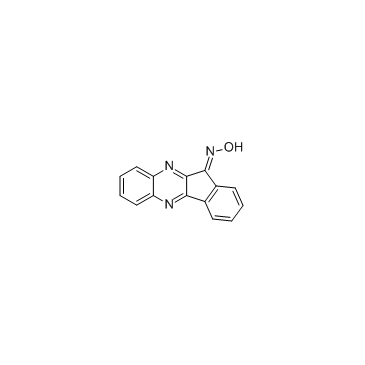23146-22-7
| Name | Indeno[1,2-b]quinoxalin-11-one oxime |
|---|---|
| Synonyms |
(11E)-N-Hydroxy-11H-indeno[1,2-b]quinoxalin-11-imine
11H-indeno[1,2-b]quinoxalin-11-one oxime Indeno[1,2-b]quinoxalin-11-one oxime IQ-1S IQ-1S (free acid) |
| Description | IQ-1 is a prospective inhibitor of NF-κB/activating protein 1 (AP-1) activity with an IC50 of 2.3±0.41 μM. IQ-1 has binding affinity (Kd values) in the nanomolar range for all three JNKs with Kds of 100 nM, 240 nM, and 360 nM for JNK3, JNK1, and JNK2, respectively. |
|---|---|
| Related Catalog | |
| Target |
JNK3:100 nM (Kd) JNK1:240 nM (Kd) JNK2:360 nM (Kd) CK1δ:0.38 μM (Kd) PI3Kγ:0.47 μM (Kd) MKNK2:0.92 μM (Kd) |
| In Vitro | Compound IQ-1 is a potent, noncytotoxic inhibitor of pro-inflammatory cytokine [interleukin (IL)-1α, IL-1β, IL-6, IL-10, tumor necrosis factor (TNF)-α, interferon-γ, and granulocyte-macrophage colony-stimulating factor] and nitric oxide production by human and murine monocyte/macrophages. The effect of IQ-1 is evaluated on LPS-induced cytokine production in human PBMCs. Among the 12 cytokines analyzed, LPS (200 ng/mL) consistently induces five (IL-1α, IL-1β, IL-6, IL-10, and TNF-α) in PBMCs compared with DMSO-treated control cells. Production of all of these cytokines is significantly inhibited by 20 μM IQ-1. Among them, TNF-α production is inhibited completely by IQ-1 (>99%), the levels of IL-1α, IL-1β, and IL-10 are decreased by 85%, and IL-6 production is decreased by 33%[1]. |
| In Vivo | When mice are dosed with 12.5 and 30 mg/kg IQ-1S (The sodium salt of IQ-1) i.p., the serum exposure of the compound is also good, with AUC0-12h values of 2.9 and 7.4 μM/h, respectively[1]. |
| Kinase Assay | Kinase profiling is performed using a panel of 91 protein kinases. In brief, kinases are produced and displayed on T7 phage or expressed in HEK-293 cells. Binding reactions are performed at room temperature for 1 h, and the fraction of kinase not bind to test compound is determined by capture with an immobilized affinity ligand and quantified by quantitative polymerase chain reaction. Primary screening at fixed concentrations of compounds is performed in duplicate. Selected hit compounds are submitted for dissociation constant (Kd) determination using the same platform. For dissociation constant Kd determination, a 12-point half-log dilution series (a maximum concentration of 100 μM) is used. Assays are performed in duplicate, and their mean value is displayed[1]. |
| Cell Assay | Human PBMCs are plated in 96-well plates at a density of 2×105 cells/well in culture medium supplemented with 3% (v/v) endotoxin-free FBS. PBMCs are pretreated with 20 μM IQ-1 or DMSO for 30 min, followed by addition of 200 ng/ml LPS for 24 h. A human cytokine MultiAnalyte ELISArray Kit is used to evaluate various cytokines (IL-1α, IL-1β, IL-2, IL-4, IL-6, IL-8, IL-10, IL-12, IL-17A, interferon (IFN)-γ, TNF-α, and granulocyte-macrophage colony-stimulating factor in supernatants of PBMCs[1]. |
| Animal Admin | Mice[1] For in vivo analysis, 12.5 or 30 mg/kg i.p. doses of IQ-1S (The sodium salt of IQ-1) are administered to BALB/c mice (15-20 animals/group), and the mice are sacrificed at various time points after compound administration. For quantification, a calibration curve is established using mouse serum samples spiked with known concentrations of IQ-1S (0.1-20 μM), and a linear dependence of the peak area with IQ-1S concentration is obtained (correlation coefficient r=0.997). The area under the serum concentration-time curve (AUC0-12h) is calculated using the linear trapezoidal method up to the last measured concentration[1]. |
| References |
| Density | 1.4±0.1 g/cm3 |
|---|---|
| Boiling Point | 511.8±43.0 °C at 760 mmHg |
| Molecular Formula | C15H9N3O |
| Molecular Weight | 247.251 |
| Flash Point | 263.3±28.2 °C |
| Exact Mass | 247.074554 |
| LogP | 2.47 |
| Vapour Pressure | 0.0±1.4 mmHg at 25°C |
| Index of Refraction | 1.774 |
| Storage condition | 2-8℃ |
